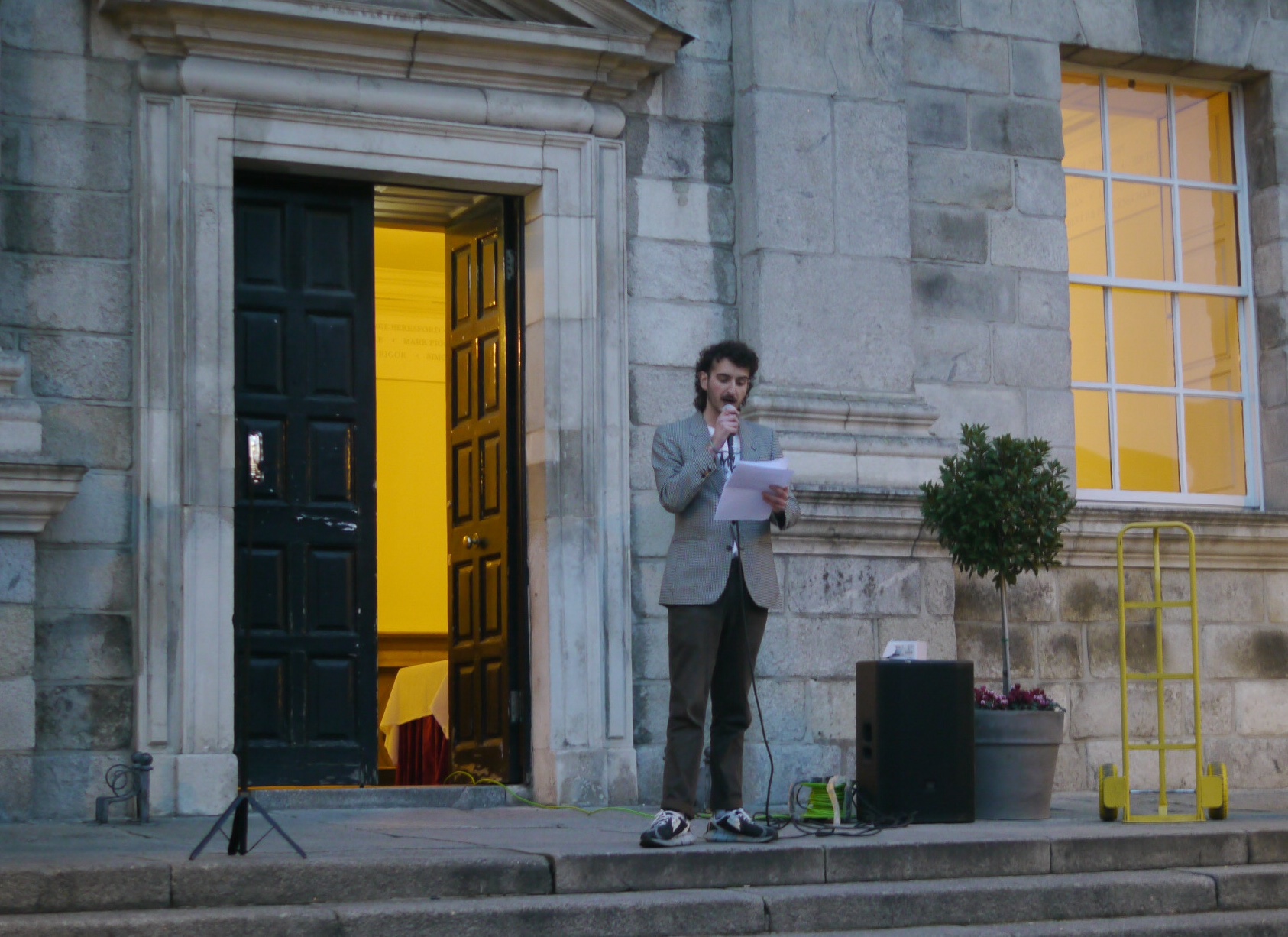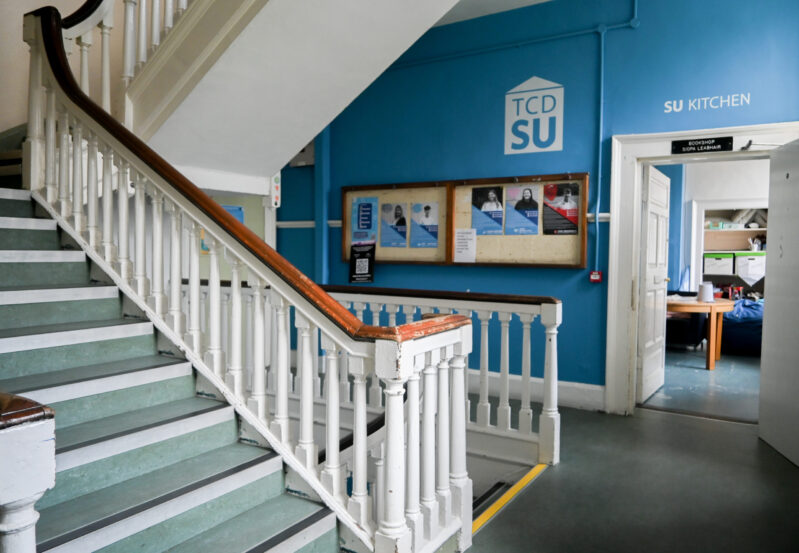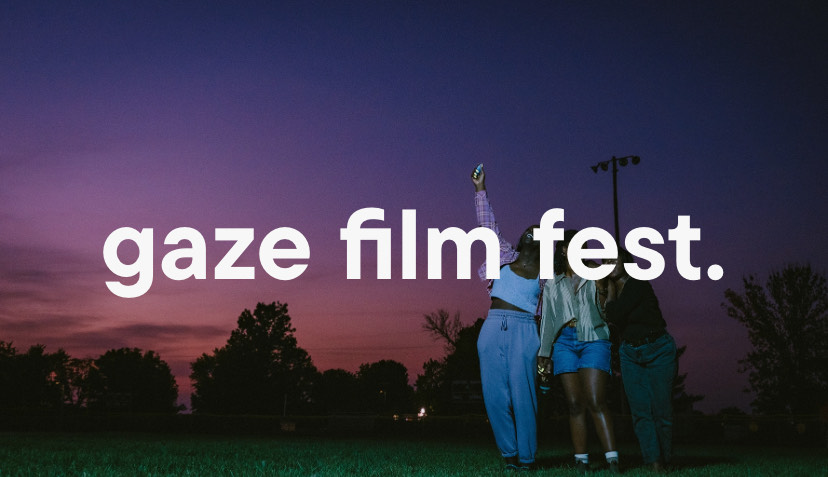This year’s Trinity College Dublin Students’ Union (TCDSU) sabbatical elections kicked off on the steps of the Dining Hall on Monday evening. Breaking with the tradition of the Dining Hall Hustings, this year’s affair was dubbed a “launch event” by Conor Casey, Chair of the Electoral Commission (EC), as he congratulated the 13 candidates on putting themselves forward.
There was no opportunity to ask the candidates questions this year, reverting to the same format used last year, with candidates accorded two minutes to give an introductory speech introducing themselves and their campaign. Going in reverse constitutional order, the Campaign Launch kicked off with the launch of candidates running for editor of The University Times and concluded with the presidential race.
With an unprecedented number of candidates contesting the sabbatical elections, the launch provided an interesting introduction to what the election season might look like.
President
Both presidential candidates spoke with confidence, taking vastly different approaches to their speeches. Ralph Balfe opened on a comedic note: “Did my great-grandfather die fighting against the British? No, he died of tuberculosis.” He wryly continued, “my great-grandfather wasn’t a great guy and we shouldn’t look to him for inspiration”. Citing the campanile as “a beautiful, iconic and proud symbol of this college”, Balfe intends to replace the monument with “a 1:1 replica of the Burj Khalifa”. Running his campaign with an air of satire, Balfe brings a breath of fresh air to the presidential race. His speech was met with whistles and excited applause from the audience.
On the other side, Jenny Maguire quickly pitched her campaign as focused on her experience: “I have seen when College doesn’t work.” She praised the Union for its “fantastic steps this year” but urged that “we can’t stop now”. Sticking largely to her manifesto, Maguire stressed the importance of student workers’ rights. As 49 per cent of students work to pay their rent, the second-year English Studies student said that “College cannot keep punishing students just because they need a job”. Maguire then pivoted to the issue of housing, criticising the “atrocious living conditions” students are subjected to. To mitigate this, Maguire plans to train “on the ground grassroots housing activists” and aims to provide students with an extra voice when they need it most”. Maguire ended on a strong note: “I want to do it all and I can do it all”.
Both candidates showed good rhetorical skills, despite significantly differing in their approaches to the campaign. With Balfe’s background in stand-up comedy and Maguire’s experience in improv comedy, the candidates have created a friendly competition in the race. Although Balfe set himself apart by saying that improv is “unforgettably cringy”, Maguire took to the microphone exclaiming “he’s [Balfe] got my vote!”.
Education
In the race for Education Officer, Eoghan Gilroy drew on his experience, explaining that he has “consistently advocated for the interests of the diverse student population”. He stressed that “no student should ever feel unheard or unsupported”. Gilroy criticised the union, stressing that “we cannot remain stagnant in our approach”. He committed to replying to queries within one business day, should he be elected, stressing the “need to take the sabbatical team outside the House Six bubble”. Sticking largely to his manifesto points, Gilroy also focused heavily on improved access to lecture recordings and planned to increase participation in class rep elections. Gilroy criticised College’s “laissez-faire approach to generative AI”, intending to advocate for students’ voices to be heard in College’s development of an AI policy.
As Sé Ó hEidhin took to the top of the steps, they opened with their aim to “open up the union” and “get the union to touch grass”. Taking a similar approach to Gilroy, Ó hEidhin said: “When you’re at your lowest the SU should be there to offer a helping hand.” It is from this basis that they set out their goal to “rebuild the union from the ground up”, intending to “fix lecture recordings”. Planning to be “more fair and more kind to students”, many of Ó hEidhin’s points came across as vague and somewhat unclear on how they plan to see them through. Aspiring to “help make Trinity the College it could be if we were all kinder to each other”, it remains to be seen how they plan on substantiating this goal beyond fixing lecture recordings.
Overall, Gilroy and Ó hEidhin mentioned largely similar issues regarding the focus of their campaigns. Although Gilroy was cut short at the end for exceeding the time limit, his speech focused on tangible goals and concrete steps he plans to take. The two candidates are leaning heavily on providing support to students, so it will be interesting to see how they answer questions at the hustings to set each other apart.
Welfare
It was getting dark as the nominees for Welfare Officer took to the steps of the Dining Hall.
Hamza Bana’s speech focused primarily on his experience gained through his time as the TCDSU Ethnic Minorities Officer. During his speech, Bana cited the insight they have gained through their involvement in cases of racial discrimination. He also spoke of his work to create an Ethnic Minorities support group that will launch on 4th March, pausing their speech to ask the crowd for a round of applause. He plans to leverage his “diverse experience” to “lead impactful campaigns” to ensure that “every student feels represented and supported through a supportive and inclusive campus environment”.
Bana also cited their experience completing First Responder training for Sexual Violence and sitting on the board of the Black and Minority Ethnic Advisory Group. Although their manifesto focused on decolonising the campus through compulsory Diversity and Sensitivity Training for staff, adding TAP students to more committees on campus and continuing to push for free menstrual products on campus, Bana did not discuss these goals within the limited time frame provided.
Nathan Harrington was the second candidate to speak on the Dining Hall steps, admitting from the get-go that he hadn’t written a speech and was going “off-note”. He gave a special shoutout to the staff of Trinity News for using his LinkedIn for his candidate profile in which he describes himself as a “full-time student, full-time baller: self-identified cocktologist, im a swag dude with a fair amount of experience”. Harrington said that his perspective on welfare “is about everyone in Trinity being happy”. He primarily highlighted points from his manifesto, which included “donating 100 per cent of my salary to buy sweets and chocolate”.
He also highlighted his plans to create a #FreetheNipple campaign week on campus “to make everyone more happy”. With regards to accessibility, Harrington spoke of an on-campus sports day with a “slip-and-slide” so that all students can participate. He also plans to install lifts in the Graduate Memorial Building (GMB) and the Museum Building. His final statement on why he should be elected is “I can do a job so you should vote for me”. Finishing his address, Harrington stumbled through an abbreviated Irish rendition of his speech accompanied by laughter from the audience.
Hannah McAuley’s decision to run is also based on her past experience in college, stating that “[she] knows what it is like to come to college and suffer”. Her speech was vague, discussing her desire to be “the most proactive welfare officer we’ve ever seen” and stating that “welfare services need to be brought to students, not the other way around”.
Whilst McAuley is passionate about improving mental health supports on campus, citing the NiteLine posters that claim “help will always be given to those in Trinity who need it” and her goal “to make that a reality”, she failed to address how she plans to achieve these goals. This may be due in part to the end of her speech where she confessed that she “is not a good enough public speaker”, leaving the gathering of students with the promise that she will “work day and night to ensure that no one in this college is left behind or feels alone”. McAuley did not mention her specific policies on student housing issues, the provision of menstrual products or support for minority groups in her speech.
Whilst Bana addressed the lack of racial representation within the Student Counselling Service, they, alongside all other candidates running for Welfare Officer, failed to make any comment regarding their stance on the current state of College Health.
Communications and Marketing
Usually the most uncontested race each year, the communications and marketing race saw three candidates take to the dining hall steps, following Michael McInerney’s withdrawal from the race, leaving Connor Dempsey, Sarah Murnane and Beth Strahan to contest the position. After a minor disruption in the running order of the speeches, with the Chair of the Electoral Commission briefly forgetting the Irish Language Officer, Connor Dempsey kicked off the Comms speeches.
Dempsey opened by saying he would use the role to “dig into what’s wrong with its institutions”. He praised the power of the union, recalling the protest at the Book of Kells last year. Dempsey believes that “students deserve to feel their representatives can do something for them”. As the outgoing Engagement Officer for the union, he committed to work in St James’s and the Hamilton for one day a week, should he be elected.
Dempsey further planned to refresh the union’s website with a “centralised hub”, and planned to integrate an accessibility policy for the union’s social media accounts and actions. Touching on student deals, which he felt were “great but sporadic” in their current form, Dempsey wished to “prioritise deals for students”. He also stressed the importance of the Irish language, guaranteeing that all SU communications would be bilingual, whilst committing to run a fully bilingual campaign. Dempsey hammered home the focal point of his campaign, closing his speech with “Anyone can talk about engagement issues, but I know what we need to do”.
Sarah Murnane took a different approach to the issue of engagement, summing up her campaign with the word “community”. Referencing YouTube, TikTok and Instagram, Murnane intends to use these platforms to “get students engaged and show them what TCDSU can do”. Murnane wants to make “things that you can actually use publicly available”, and thereby hopes to advertise internships and postgraduate opportunities on SU platforms.
Murnane also mentioned plans to “introduce an SU newspaper”. While Murnane was unclear on what form this newsletter would take, she was perhaps suggesting that the current weekly email is not a sufficient way to distribute information. She aims to “revamp” the union’s sponsorships, focusing on “local” and “student-led” partnerships. She stressed “transparency and accessibility” in her planned policy, but was unfortunately cut off before she could expand on these points.
Beth Strahan stressed “campus-wide engagement” in her speech. Mentioning her background as a theatre-maker and director, Strahan spoke of her ability “to create a public-facing product that can sell tickets, and that can cater to the interests of a majority” when working on a project. She criticised the “niche” nature of the union, noting “so much energy is put into Junior Fresh engagement, especially during Freshers’ week”. She identified an “inevitable” dip in interest towards the end of Michaelmas semester: “The train has seemingly lost steam”.
Strahan went on to question why the majority of the student body does not seem “to care about their SU”. She claims this is because they “don’t know or understand the mechanics of the SU”. Strahan closed with her desire for “an SU for all”, citing the three tenets of her manifesto: “transparency, critical accountability and diverse engagement”. Although Strahan underscored her experience in theatre as an advantage to the role of comms officer, it remained slightly unclear how she planned to translate these skills into concrete policies if elected.
Although engagement, accessibility and transparency were buzzwords for all three candidates, their planned policies addressed different facets of the issues. All three candidates were confident throughout their speeches, but Dempsey came across as more hands-on in his approach. On the other hand, Murnane and Strahan focused on increasing visibility more generally. It remains to be seen how they will differentiate themselves to appeal to voters throughout their campaigns.
Gaeilge
The sole candidate for the newly introduced position of Gaeilge Officer is Pádraig Mac Brádaigh. The fourth-year Irish student is running his campaign on the premise that he has “seen every side of the Irish language on campus”. Mac Brádaigh currently serves as the union’s part-time Oifigeach na Gaeilge and led the campaign team YesGaeilgeTCD which pushed for the Gaeilge Initiative referendum last month. In his speech, he spoke of his plans to “work with the college and education officer to create a long-term action plan” for making learning through Irish accessible through a variety of courses.
He calls it “not fair or right” that students can only receive an education through the Irish language by studying a BA in Early and Modern Irish, with hopes to begin approaching a bilingual teaching strategy. Mac Brádaigh called Irish “not just a hobby, but a medium of life” and spoke of a need for “equity for the Irish language”. He emphasised the need to work alongside the Ents Officer to have Irish events, making Irish accessible through not only education but through nights out.
Ents
Running uncontested this year, sole candidate Peadar Walsh emphasised the importance of “sustainable and accessible events” as a core principle of his campaign. He spoke of getting more support to run society events with societies both big and small.
Walsh stressed the need for safety at Trinity Ball to be ensured for students through “drug safety techniques and proper crowd control”. Speaking very unclearly about specifics, Walsh mentioned running events geared towards “philanthropic causes” with no indication as to what causes he intends to support or if he would use a percentage of the funding towards his aforementioned TBall safety manifesto point. Walsh stated that a vote for him would be a vote “for someone with plenty of experience in event management” and that he was “very excited to achieve far more in the role of Ents Officer”.
Editor of The University Times
Charlie Hastings was the first person to speak at the launch event. He started by noting his “three years of experience” in the paper, stating “it is with this assurance in my mind that I put myself forward to try and be your next Editor”. Hastings, who is the current Chair of the Editorial Board for the paper, was part of the mass-firing that took place by the previous Editor-in-Chief, Ailbhe Noonan. Hastings emphasised the paper’s need to focus on accessibility, through weekly office hours and regular welfare meetings, ensuring there is always a “direct line of communications between the editor and the wider student body”.
Hastings continued, stressing that The University Times must “strengthen our ties with the Student Disability Co-op and the Trinity Access Programme (TAP) with more coverage and writer recruitment”. One of his goals in the paper will be to introduce a Visibility Editor in Radius to “give a member of staff the power to seek out stories that represent the Gaeilgeoir, LGBTQ+ and gender and ethnic minority communities on campus”. He also emphasised the importance of upholding the paper’s online presence by “fixing the broken and inactive elements on the website”.
Brídín Ní Fhearraigh-Joyce approached her speech by introducing herself and her campaign through Irish first. Her address stuck largely to the script of her Instagram campaign video, both beginning with “a vote for me is a vote for accessibility”. Her first point was her proposal to run a journalism school for Transition Year students in DEIS schools and schools participating in the TAP program. Ní Fhearraigh-Joyce did not address issues of accessibility within the paper itself.
Her second point related to “actively increasing” ethnic minorities within the newspaper’s team, through interacting with societies supporting minority groups on campus and “creating a legacy of equality”. As a native Irish speaker, Ní Fhearraigh-Joyce promised to “ensure each section has Irish content”. She further elaborated on her desire to grow the team by “encouraging STEM students to join” by advertising opportunities in the newspaper and in STEM buildings, and by working with the STEM convenor. She added that she would further encourage involvement by hosting pitching workshops for students and encouraging students to write on issues that affect them, making The University Times more relevant to the student body.
Ní Fhearraigh-Joyce cited her experience as previous Co-Editor-In-Chief of TN2, current Co-Deputy News Editor of The University Times, Head Copyeditor for Evergreen Trinity and Campus Ambassador for Hot Press Magazine as making her qualified for the role of Editor by “working with diverse editorial styles”. According to Ní Fhearraigh-Joyce, she has written “over 30 articles and edited over 100” in the last year. She finished her speech by saying “I’m a friendly person”.
Whilst both candidates emphasised the importance of accessibility and welfare in their approach to the paper, The University Times has been under scrutiny in previous years, making this a point of contention that could set these candidates apart. Hastings’s experience of being fired from the paper after criticising the Editor at the time may grant him insight into what happens when the paper doesn’t work. Ní Fhearraigh-Joyce brings an outsider perspective, having only been involved for a short time, which could provide fresh ideas. Overall, Hastings seemed more concerned with the current parameters of the paper and acknowledged the various sections involved in the publication. Ní Fhearraigh-Joyce seemed to focus on growing the team and expanding the paper, although she failed to mention her specific goals in regards to any sections outside of news.







